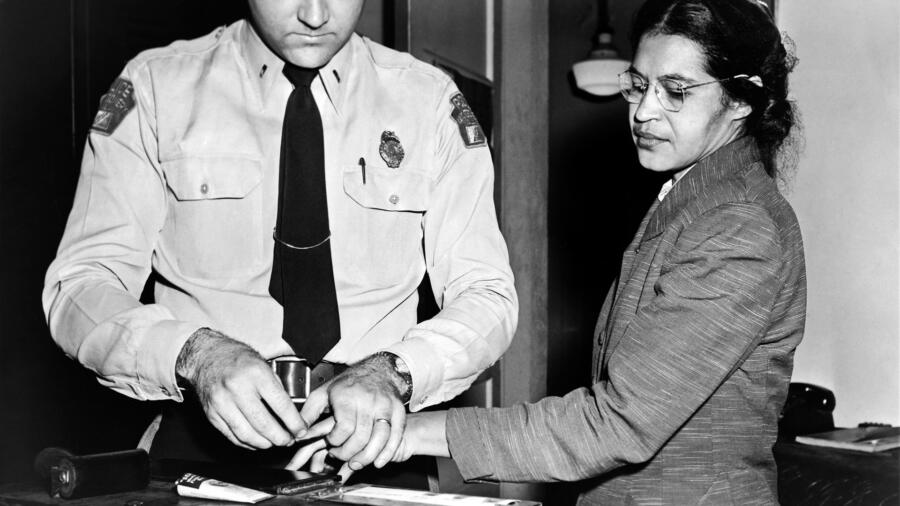On December 1, 1955, Rosa Parks refused to comply with the bus segregation law in Montgomery, AL and was arrested. Her bold action of resistance inspired the Montgomery Bus Boycott, one of the largest and most successful mass movements against racial segregation in history. The boycott led to the desegregation of the Montgomery bus system and inspired countless other actions of civil disobedience that ultimately led to the dismantling of segregation in the United States of America. As the “mother of the modern-day civil rights movement,” Parks remains an international icon of freedom and liberty to this day.
Rosa Louise McCauley was on February 4, 1913 in Tuskegee, AL. Her mother was a teacher and her father was a carpenter. From an early age, she experienced deep seated racism, attended a segregated school system, witnessed the KKK march past her house, and was often bullied by the white children in her rural neighborhood.
Her 1932 marriage to Raymond Parks, a barber and active member in the NAACP, signaled the beginning of her lifelong dedication to the civil rights movement. In 1943, she joined the Montgomery chapter of the NAACP and became leader E.D. Nixon’s secretary. Previous to Parks’ bold move on December 1, 1955, other brave activists had already refused to acquiesce to bus segregation rules, starting with Bayard Rustin in 1942 to the members of the 1956 lawsuit, Browder v. Gayle, that included Claudette Colvin. The NAACP believed that Parks would be an ideal citizen to also challenge the discriminatory Montgomery law.
When Parks boarded the bus in downtown Montgomery after a long day’s work as a department store seamstress, she had recently attended civil disobedience training. She took a seat in the first several rows of the section designated for “colored” passengers. The Montgomery city code stated that bus drivers had police officer power to enforce the public segregation laws. So, when the bus driver noticed that several white passengers did not have seats, he requested that Parks and three other black passengers stand up so they could sit. Parks refused to move. The driver demanded, “Why don’t you stand up?” to which Parks replied, “I don’t think I should have to stand up.” She was subsequently arrested, taken to police headquarters and released on bail. Four days later at her trial, Parks had to pay a fine of $10 plus $4 in court costs when she was found guilty of disorderly conduct and violating a local ordinance.
In her autobiography, “My Story,” she explained her decision to defy racial segregation: “People always say that I didn’t give up my seat because I was tired, but that isn’t true. I was not tired physically, or no more tired than I usually was at the end of a working day. I was not old, although some people have an image of me as being old then. I was forty-two. No, the only tired I was, was tired of giving in.”
Her refusal to surrender her bus seat launched the 381-day Montgomery Bus Boycott led by Dr. Martin Luther King, Jr. Starting on December 5, 1955, the day of Parks’ trial, the boycott destroyed the finances of the bus company and hurt the businesses in downtown Montgomery. Ultimately, the economic pressure gave the city no other choice but to remove the bus segregation law.
Although Parks inspired a movement that would ultimately result in the Civil Rights Act of 1964, the federal law that banned racial segregation in all public places in the United States, she lost her job as a seamstress and received death threats for years after her arrest. She ultimately moved to Detroit and worked as a secretary to a U.S. representative from 1965 to 1988, while staying active in the civil rights movement.
Before her 2005 death at 92 years old, Parks received multiple honors and awards, including the Presidential Medal Freedom as well as the Congressional Gold Medal. Four thousand people attended funeral in Detroit and she was the first woman and non-United States government official to lie in honor at the Capitol Rotunda in Washington, D.C. Her legacy lives on today as new groups continue the fight against institutionalized racism that still exists in America.


